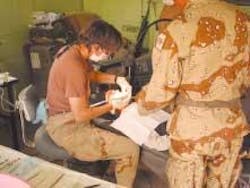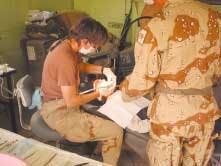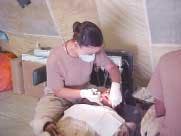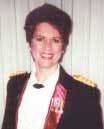From Iraq ... with love
Not a day goes by that attention isn't drawn to our soldiers in Iraq. From CNN coverage to local tributes, heroes are highlighted who give their all — even their lives — for freedom. Follow WDJ beyond yellow ribbons and patriotic displays as we feature two courageous women dentists serving in Iraq.
Dr. Waleska Flores, a captain in the U.S. Army since 2000, is a native of Puerto Rico. She entered the Army to pay off her student loans without having the business concerns of private practice. Her best friend joined the Army Dental Corps as well. Dr. Flores laughs, "Our friends still can't believe that we joined the Army, because we always wore high heels, nice clothes, and were always very feminine."
Based out of Fort Hood, Texas, Dr. Flores is the only dentist in the 549th Area Support Medical Company unit. Since arriving in Iraq, her unit has convoyed to numerous locations. Although she can function independently, she temporarily joined forces with the 28th Combat Support Hospital (CSH) dentist approximately one hour outside of Baghdad. Dr. Flores' dental clinic is a tent with three chairs. She provides oral health care for patients evacuated from the greater Baghdad area, enemy prisoners of war, and more than 8,000 soldiers.
"We're pretty busy. Our sick call hours are 8 a.m. to 8 p.m. seven days a week, but we are open 24/7 for all dental emergencies. Most of the cases we see are oral surgeries, but we also treat minor traumas, oral/facial infections, and perform numerous restorative and endodontic procedures. We have a hygienist to provide preventive care. We are very proud of the job we have done. We are here for the soldiers."
As she wrote in one of several emails, "Living conditions are not the best, as you can imagine. We live in tents. For showers, you can hang your camping shower (like I do) or simply use a bucket. For toilets, we have wooden 'boxes.'"
There are no phones or television and basically no entertainment. The only form of communication is the Internet and mail (which takes a month to arrive). Initially meals were prepackaged military Meals Ready To Eat (MREs), and water was a sensitive issue. Now Dr. Flores has plenty of water and access to hot meals. "The company cook does a wonderful job finding food and making at least one hot meal a day. That really helps with morale. Nothing is better!
"The most difficult aspect of being deployed is fear of the unexpected. I was afraid of what could happen, but I always focused on my mission and my family, because I had told them they were not going to cry for me."
Dr. Flores endured several Scud alerts, where she donned her gas mask, ran for cover, and slept in full chemical protective gear in a bunker. Once, the nearby ordinance warehouse where ammunition, bombs, and missiles are kept exploded. Rockets and debris were flying in different directions. Bombs exploded about 150 meters away from her. "That was scary," she said. "A few landed in the 28th CSH area. It was a long night. We had to transport patients." No patients were without treatment, nor was anyone injured.
Dr. Flores described a soldier med-evacuated with facial trauma — an Iraqi child had thrown a rock in his face. The soldier lost some teeth and suffered lacerations on the lip and face. He was lucky it wasn't a grenade like his battle buddy sustained.
She related another experience when two ambulances arrived carrying four young Iraqi children. They were playing and found a grenade, which exploded. Thankfully her unit has a pediatrician, because the children needed special care. Other instances occurred where children did not survive.
Dr. Flores summarizes her feelings about being deployed in Iraq: "We came to a country with a very different culture. Many of the Iraqi people have been raised to hate; it is part of their normal lifestyle. Some knew they were oppressed. At first I had questions about why I was here. One day while in a convoy, I saw a lot of children running, asking for food. At that moment I knew why we were here — we had come from the Land of the Free to liberate a country."
The second hero in the WDJ spotlight is Dr. Robin Bruno, a lieutenant colonel in the U.S. Army. Dr. Bruno is the dental surgeon for the 3rd Infantry Division, based out of Fort Stewart, Ga. Her job is to advise the commanding general about all dental-related information and to lead within the division's Main Support Battalion in caring for its soldiers.
Dr. Bruno returned to the United States to attend the Academy of General Dentistry meeting in Nashville in July. Jet-lagged and trying to acclimate to being outside a war zone, she shared vivid experiences and photographs. She often stopped to apologize for her colorful "war language," and laughed about adjusting to life state-side: "I would just watch the water swirl in the toilet!"
Describing several events where bullets were flying overhead, she kept thinking, "Here I am, a dentist, and I'm in the middle of a war!" Although she said it was far more surreal than scary, her anxieties were obvious as she told story after story.
Dr. Bruno summarized her experiences as "the best of times and the worst of times." The heat soared to over 150°F during the summer, but when she arrived in March, the nights were extremely cold. "I've never been colder in my life than when we convoyed," she said. The sand was so fine that it flowed like water as vehicles drove through it. It penetrated everything. What seemed to be a haze in the air actually turned out to be airborne sand particles. She wore scarves around her nose and mouth to reduce the amount of sand she inhaled, especially during convoys.
Dr. Bruno described their first mass casualty: Before patients arrived, the medics clowned around, but everyone knew it was a reaction to high anxiety levels. Although the group was highly trained through many mass casualty exercises, this was the real thing. Once the patients came, the medics began triage and treatment with competence and precision. Dr. Bruno treated a female soldier with severe cheek lacerations and several teeth shattered down to the osseous level.
"I was so impressed with the wounded soldiers and their wide range of reactions. Some had severe wounds — they had to be in great pain — but they were calm and even joked around. Others were minimally injured but appeared to be in agony. Our psychiatrist was very busy and greatly needed. Everyone was valuable; I just wished the units understood how valuable we were to them all the time, instead of only when they sustained mass casualties."
Dr. Bruno befriended the people in a small, poverty-stricken village. "It was full of the most generous people I've ever met." So appreciative of what the American soldiers did for them, one family prepared a lavish meal just for Dr. Bruno. The women cooked outside. They formed and flattened the bread ("utterly the most tasty bread I've ever eaten") in their hands, then threw it against the sides of an oven that looked more like a three-foot sand volcano. They knelt around her as she ate. Unable to speak each other's language, they laughed together as they communicated through sign language and pictures.
Dr. Bruno was able to provide the villagers some badly needed dentistry. She communicated through an interpreter as well as the village dentist, who spoke some English. The children seemed extremely frightened by the village dentist's demeanor, and they didn't dare move. Wondering if they had ever had local anesthesia, Dr. Bruno performed a number of restorations and extractions.
The villagers who had little gave everything, while Saddam Hussein lived in selfish splendor. Pictures showed Dr. Bruno hamming it up in gilded carriages found within one of the commandeered palaces. One baroque-styled carriage was so ornate that it looked like it belonged in Disney World's fairy tale setting.
Wrapping up her stories, Dr. Bruno said, "I love our country more than words can describe. The American flag means everything to me, and I am so proud to serve my country. I am incredibly grateful for the opportunities we have in the States."
Drs. Flores and Bruno, we are incredibly grateful for all of your sacrifices. You support our soldiers not only with oral health care in the most austere of conditions, but you grace soldiers and Iraqis alike with humility, respect, and a sense of humor. We pray that you remain out of harm's way and soon return to the Land of the Free. SALUTE!
Kathryn A. Cripps, DDS
Col. Cripps has served in the U.S. Army in the United States and Germany. Currently, she is director for the advanced education in general dentistry program and deputy commander for the dental activity at Fort Sill, Okla. You may contact Cripps at kathryn.cripps@ cen.amedd.army.mil.



